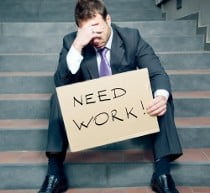 It is no surprise to anyone that joblessness is a depressing thing to contemplate for most people. What many people do not immediately realize is the complex equation that connects Joblessness and Depression.
It is no surprise to anyone that joblessness is a depressing thing to contemplate for most people. What many people do not immediately realize is the complex equation that connects Joblessness and Depression.
The first thing to recognize is that while “being depressed” and even “depression” are terms used fairly frequently in everyday speech, Depression is a clinical term covering a range of different states.
Depression is a mental illness affecting about 10% of the population at any given time, and it is characterized by persistent feelings of sadness, hopelessness, and worthlessness that don’t seem to go away. The confusion often stems form the fact that these feelings -sadness, hopelessness, and worthlessness- can be triggered by a number of different causes, one of which is a traumatic life event such as losing a job. It is natural and normal to have these feelings when one becomes unemployed; that is “being depressed. It is another thing, however, for these feelings to persist without relief for a prolonged period of time; that is usually a sign of Clinical Depression.
It is important to recognize that there is no one cause of being depressed after the loss of a job. Among the factors playing into how a person might feel are a sense of unfairness and victimization, changes in daily routine, being cut off from former colleagues (some of whom may still have their jobs), and of course, the financial stress and uncertainty that the loss of income brings.
For many people, studies show particularly for men, the financial strains are compounded by a loss of self-esteem since men more often derive their self-image from their careers, and the status and money those careers provide. They experience a shattering sense of losing control when a job or career comes to an end, and many react badly. It is also true that just getting “another job” does not make these feelings go away. Being underemployed, earning a significant amount less that he used to, or being in a lower status job can all contribute to a continuation of these feelings even if a guy is working again.
Whether male or female, experts suggest that, as with the death of a loved one or the sudden end of a relationship, there are “phases” to coming to grips with the reality of job loss; Shock – Anger – Sadness – Reality – and understanding these phases can help the healing process. It is normal, it is a progression most people must go through, and they should be handled in turn.
There are also a number of useful tips everyone should remember if facing the loss of a job; and there are things you can do to manage your reaction to the loss of a job. Among these are:
- Don’t burn any bridges. While it is very tempting to tell you boss and everyone else in your former workplace where to go, it usually is not a good idea to vent in this way. To being with, yours would not be the first workplace to experience a change in fortunes and want its old employees back. Telling the boss off is probably not going to put at the top of the list of those they call back. Also, people talk…and making a dramatic exit will very likely not stay within the four walls of your old office
- Take control of your finances and cut back. This doesn’t mean immediately canceling Christmas, but it does mean that there may be certain things you can’t afford right now. Maybe you had your heart set on buying that speedboat…but now probably isn’t the time to be calling the salesman. Don’t try to make yourself feel better or pretend that everything is normal by spending.
- Get buy-in from your family. Many people think they should or can protect their children by not telling them the facts of the new situation. In the end, this usually helps no one. The kids do not have to know all the details, but they ought to at least be made to understand that things are tight right now, but that they will get better. It will at minimum keep them from being in a situation they completely do not understand.
- Be flexible. It may not be possible to completely replicate everything you had at your old job. There may be perks that you once had that the current economy simply isn’t providing. Be realistic, and look forward at the possibilities in front of you, not backwards at what you left behind.
Feeling sad, angry, and maybe even worthless after losing a job is common. If you or a loved one is feeling these things, it’s normal and there probably isn’t much reason to worry.
But if these negative emotions continue or seem to get worse, or if simply getting out of bed is becoming an effort or not worth the trouble, then call Capital EAP for help. These may be signs of Depression. Feeling badly when bad things happen is normal; being continually miserable is not.
